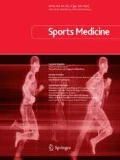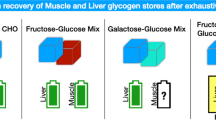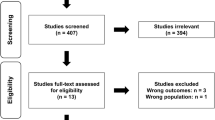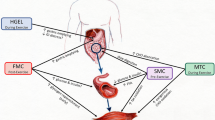Summary
The physiological and performance effects of carbohydrate ingestion/supplementation on aerobic endurance exercise have been extensively studied. However, little attention has been given to the effects of carbohydrate ingestion on resistance exercise and training. Recent evidence suggests that resistance exercise can elicit a considerable glycogenolytic effect, which can lead to fatigue and strength loss.
The ability of carbohydrate ingestion immediately before and during resistance exercise to enhance performance is unclear at present, however carbohydrate ingestion following resistance exercise has been shown to enhance muscle glycogen resynthesis. This may decrease recovery time following resistance exercise and enable an increase in training volume which may enhance physiological adaptations. Also, carbohydrate ingestion during or immediately after resistance exercise has been shown to increase postexercise insulin and growth hormone levels, which may lead to increased protein synthesis and hypertrophy, although this has not been systematically investigated.
Despite the potential benefits of carbohydrate ingestion for performance of resistance exercise and adaptation to resistance training, at present little empirical evidence is available to support this hypothesis.
Similar content being viewed by others
References
Bjorkman O, Sahlin K, Hagenfeldt L, et al. Influence of glucose and fructose ingestion on the capacity for long-term exercise in well-trained men. Clin Physiol 1984; 4: 483–94
Coyle EF, Hagberg JM, Hurley BF, et al. Carbohydrate feeding during prolonged strenuous exercise can delay fatigue. J Appl Physiol 1983; 55 1: 230–5
Fielding RA, Costill DL, Fink WJ, et al. Effects of carbohydrate feeding frequencies and dosage on muscle glycogen use during exercise. Med Sci Sports Exerc 1985; 17 4: 472–6
Ivy JL, Miller W, Dover V, et al. Endurance improved by ingestion of a glucose polymer supplement. Med Sci Sports Exerc 1983; 15 6: 466–71
Ivy JL, Yaspelkis BB, Anderla PA, et al. Effect of liquid and solid carbohydrate supplements on muscle glycogen and performance during prolonged exercise [abstract]. Med Sci Sports Exerc 1993; 25(5 Suppl.): S141
Hargreaves M, Costill DL, Fink WJ, et al. Effect of carbohydrate feedings on muscle glycogen utilization and exercise performance. Med Science Sports Exerc 1984; 16 3: 219–22
Ivy JL, Costill DL, Fink WJ, et al. Influence of caffeine and carbohydrate feedings on endurance performance. Med Sci Sports Exerc 1979; 11 1: 6–11
Mitchell JB, Costill DL, Houmard JA, et al. Effects of carbohydrate ingestion on gastric emptying and exercise performance. Med Sci Sports Exerc 1988; 20: 110–5
Mitchell JB, Costill DL, Houmard JA, et al. Influence of carbohydrate dosage on exercise performance and glycogen metabolism. J Appl Physiol 1989; 67: 1843–9
Neufer PD, Costill DL, Flynn MG, et al. Improvements in exercise performance: effects of carbohydrate feedings and diet. J Appl Physiol 1987; 62 3: 983–8
Coyle EF, Coggan AR, Hemmert MK, et al. Muscle glycogen utilization during prolonged strenuous exercise when fed carbohydrates. J Appl Physiol 1986; 61 1: 165–72
Bagby G, Green HJ, Katsuta S, et al. Glycogen depletion in exercising rats infused with glucose, lactate, and pyruvate. J Appl Physiol 1978; 59: 423–6
Bergstrom J, Hultman E. A study of the glycogen metabolism during exercise in man. Scand J Clin Lab Invest 1967; 19: 218–28
Keul J, Haralambie G, Bruder M, et al. The effect of weight lifting exercise on heart rate and metabolism in experienced weightlifters. Med Sci Sports Exerc 1978; 10: 13–5
McMillan JL, Stone MH, Sartin J, et al. 20-hour physiological responses to a single weight-training session. J Strength Cond Res 1993; 7 1: 9–21
Robergs RA, Pearson DR, Costill DL, et al. Muscle glycogenolysis during differing intensities of weight-resistance exercise. J Appl Physiol 1991; 70 4: 1700–6
Lesmes GR, Benham DW, Costill DL, et al. Glycogen utilization in fast and slow twitch muscle fibers during maximal isokinetic exercise. Ann Sports Med 1983; 1: 105–8
MacDougall JD, Ray S, McCarteny N, et al. Substrate utilization during weight lifting [abstract]. Med Sci Sports Exerc 1988; 20(2): S66
Tesch PA, Colliander B, Kaiser P. Muscle metabolism during intense, heavy resistance exercise. Eur J Appl Physiol 1986; 55: 362–6
Boobis I, Williams C, Wooton SN. Human muscle metabolism during brief maximal exercise. J Physiol (Lond) 1983; 338: 21P–2P
Boobis I, Williams C, Wooton SN. Influence of sprint training on muscle metabolism during maximal exercise in man. J Physiol (Lond) 1983; 342: 36–7
Cheetham ME, Boobis LH, Brooks S, et al. Human muscle metabolism during sprint running. J Appl Physiol 1986; 61: 54–60
Harris AD, Hultman E, Sahlin K. Glycolytic intermediates in human muscle after isometriccontraction. Pflugers Arch 1989; 389: 277–82
Jacobs I, Tesch PA, Bar-Or O, et al. Lactate in human skeletal muscle after 10 and 30 s of supramaximal exercise. J Appl Physiol 1983; 55: 365–7
Spriet LL, Lindinger ML, McKelvie RS, et al. Muscle glycogenolysis and H± conentration during maximal intermittent cycling. J Appl Physiol 1989; 66: 8–13
Vollestad NK, Tabata I, Medbo JI. Glycogen breakdown in different human muscle fibre types during exhaustive exercise of short duration. Acta Physiol Scand 1992; 144: 135–41
Lambert CP, Flynn MG, Boone JB, et al. Effects of carbohydrate feeding on multiple-bout resistance exercise. J Appl Sports Sci Res 1991; 5: 192–197
Pascoe DD, Costill DL, Fink WJ, et al. Glycogen resynthesis in skeletal muscle following resistive exercise. Med Sci Sports Exerc 1993; 25: 349–54
Fahey TD, Hoffman K, Colvin W, Lauten G. The effects of intermittent liquid meal feeding on selected hormones and substrates during intense weight training. Int J Sport Nutr 1993; 3: 67–75
MacDougall JD, Ward GR, Sale DG, et al. Biochemical adaptation of human skeletal muscle to heavy resistance exercise training and immobilization. J Appl Physiol 1977; 43: 700–3
Abernethy PJ, Thayer R, Taylor AW. Acute and chronic responses of skeletal muscle to endurance and sprint exercise. Sports Med 1990; 10: 365–89
Gollnick PD. Peripheral factors as limitations to exercise capacity. Can J Appl Sport Sci 1982; 7: 14–21
Henriksson J. Training induced adaptations of skeletal muscle and metabolism during submaximal exercise. J Physiol 1977; 276: 661–75
Terjung RI, Baldwin KM, Mohr PN, et al. Effect of running to exhaustion on skeletal muscle mitochondria: a biochemical study. Am J Physiol 1972; 223 3: 549–54
Costill DL, Gollnick PD, Jansson ED, et al. Glycogen depletion pattern in human muscle fibre during distance running. Acta Physiol Scand 1973; 89: 374–83
Essen B. Glycogen depletion of different fibre types in human skeletal muscle during intermittent and continuous exercise. Acta Physiol Scand 1978; 103: 446–55
Gollnick PD, Piehl K, Saltin B. et al. J Physiol 1974; 241: 45–57
Gollnick PD, Piehl K, Saubert CW, et al. Diet, exercise and glycogen changes in human muscle fibres. J Appl Physiol 1972; 33: 421–5
Green HJ. Glycogen depletion patterns during continuous and intermittent ice skating. Med Sci Sports Exerc 1978; 10: 183–7
Thomson JA, Green HJ, Houston MB. Muscle glycogen depletion patterns in fast twitch fibre subgroups of man during submaximal and supramaximal exercise. Pflugers Arch 1979; 379: 102–8
Gollnick PD, Armstrong RB, Sembrowick WI, et al. Glycogen depletion in human skeletal muscle fibres after heavy exercise. J Appl Physiol 1973; 34: 615–8
Anderson P, Sjogaard G. Selective glycogen depletion in subgroups of type II muscle fibres during intense submaximal exercise in man. Acta Physiol Scand 1976; 96: 26–7a
Nilson LH, Hultman E. Liver and muscle glycogen in man after glucose and fructose infusion. Scand J Clin Lab Invest 1974; 33: 5–10
Costill DL, Sherman WM, Fink WJ, et al. The role of dietary carbohydrates in muscle glycogen resynthesis after strenuous running. Am J Clin Nutr 1981; 34: 1831–6
Bergstrom J, Hermansen L, Hultman E, et al. Diet, muscle glycogen, and physical performance. Acta Physiol Scand 1967; 71: 140–50
Jacobs I, Kaiser P, Tesch P. Muscle strength and fatigue after selective glycogen depletion in human skeletal muscle fibers. Eur J Appl Physiol 1981; 46: 47–53
Leatt PB, Jacobs I. Effect of glucose polymer ingestion on glycogen depletion during a soccer match. Can J Appl Sport Sci 1989; 14 2: 112–6
Ahlborg G, Felig P. Influence of glucose ingestion on the fuel-hormone response during prolonged exercise. J Appl Physiol 1976; 41: 683–8
Coggan AR, Coyle EF. Carbohydrate ingestion during prolonged exercise: effects on metabolism and performance. In: Holloszy JO, editor. Exercise and sport science reviews. Vol. 19. Baltimore (MD): Williams & Wilkins, 1991: 1–40
Costill DL, Miller JM. Nutrition for endurance sport: carbohydrate and fluid balance. Int J Sports Med 1980; 1: 2–14
Ivy JL, Lee MC, Brozinick JT, et al. Muscle glycogen storage after different amounts of carbohydrate ingestion. J Appl Physiol 1988; 65: 2018–23
Sherman WM. Carbohydrate feedings before and after exercise. In: Lamb DR, Williams MH, editors. Ergogenics: enhancement of performance in exercise and sport. AnnArbor (MI): Wm.C. Brown, 1991: 1-26
Costill DL, Pascoe DD, Fink WJ, et al. Impaired muscle glycogen resynthesis after eccentric exercise. J Appl Physiol 1990; 69: 46–50
Doyle JA, Sherman WM, Strauss RL. Effects of eccentric and concentric exercise on muscle glycogen replenishment. J Appl Physiol 1993; 74: 1848–55
Widrick JJ, Costill DL, McConell GK, et al. Time course of glycogen accumulation after eccentric exercise. J Appl Physiol 1992; 72: 1999–2004
Evans WJ. Muscle damage: nutritional considerations. Int J Sport Nutr 1991; 1: 214–24
Asp S, Kristiansen S, Richter EA. Eccentric muscle damage transiently decreases rat skeletal muscle GLUT-4 protein. J Appl Physiol. 1995; 75: 1338–45
Whitney NA, Boyle MA. Understanding nutrition, 4th ed. St Paul (MN): West, 1987
Andres R, Cader G, Zierler KL. The quantitatively minor role of carbohydrate in oxidative metabolism by skeletal muscle in intact man in the basal state. Measurements of O2 and glucose uptake and CO2 and lactate production in the forearm. J Clin Invest 1956; 35: 671–82
Katz G, Broberg S, Sahlin K, et al. Leg glucose uptake during maximal dynamic exercise in humans. Am J Physiol 1986: 251: E65–70
Wahren J. Glucose metabolism during leg exercise in man. J Clin Invest 1971; 50: 2715–25
Ahlborg G, Felig P. Lactate and glucose exchange across the forearm, legs, and splanchnic bed during and after prolonged leg exercise. J Clin Invest 1982; 69: 45–54
Broberg S, Sahlin K. Adenine nucleotide degradation in human skeletal muscle during prolonged exercise. J Appl Physiol 1989; 67: 116–22
Ahlborg G, Felig P, Hagenfeldt L, et al. Substrate turnover during prolonged exercise in man. J Clin Invest 1974; 53: 1080–90
Coggan AR, Coyle EF. Reversal of fatigue during prolonged exercise by carbohydrate infusion or ingestion. J Appl Physiol 1987; 63: 2388–95
Farrell PA, Garthwaite TL, Gustafson AB. Plasma adreno-corticotropin and cortisol responses to submaximal and exhaustive exercise. J Appl Physiol 1983; 55: 1441–4
Galbo H, Holst JJ, Christensen NJ. Glugagon and plasma catecholamine responses to graded and prolonged exercise in man. J Appl Physiol 1975; 38: 70–6
Kindermann W, Schnabel A, Schmitt WM, et al. Catecholamines, growth hormone, cortisol, insulin, and sex hormones in anaerobic and aerobic exercise. Eur J Appl Physiol 1982; 49: 389–99
Conley MS, Stone MH, Marsit JL, et al. Effects of carbohydrate ingestion on resistance exercise [abstract]. J Strength Condition Res 1995; 9(3): 201
Winder WW, Hickson RC, Hagberg JM, et al. Training induced changes in hormonal and metabolic responses to submaximal exercise. J Appl Physiol 1979; 46: 766–71
Hermansen L, Hultman E, Saltin B. Muscle glycogen during prolonged severe exercise. Acta Physiol Scand 1967; 71: 129–39
Brooks GA, Fahey TD. Exercise physiology: human bioenergetics and its applications. New York (NY): Macmillan, 1985
Pike RL, Brown M. Nutrition: an integrated approach, 2nd ed. New York: John Wiley & Sons, 1975
Essen-Gustavsson B, Tesch PA. Glycogen and triglyceride utilization in relation to muscle metabolic characteristics in men performing heavy-resistance exercise. Eur J Appl Physiol 1990; 61: 5–10
Sharp T, Reed G, Bates B, et al. Influence of a previous diet on substrate oxidation during and after exercise [abstract]. Med Sci Sports Exerc 1992; 24: S50
Nieman DC. Fitness and sports medicine: an introduction. Palo Alto (CA): Bull, 1990
Busso T, Hakkinen K, Pakarinen A, et al. Hormonal adaptations and modelled responses in elite weightlifters during 6 weeks of training. Eur J Appl Physiol 1992; 64: 381–6
Hakkinen K, Pakarinen A, Alen M, et al. Serum hormones during prolonged training of neuromuscular performance. Eur J Appl Physiol 1985; 53: 287–93
Hakkinen K, Pakarinen A, Alen M, et al. Relationships between training volume, physical performance capacity, and serum hormone concentrations during prolonged training in elite weight lifters. Int J Sports Med 1987; 8: 61–5
Hakkinen K, Pakarinen A, Alen M, et al. Daily hormonal and neuromuscular responds to intense strength training in one week. Int J Sports Med 1988; 9: 422–8
Hakkinen K, Pakarinen A, Alen M, et al. Neuromuscular and hormonal responds in elite athletes to two successive strength training sessions. J Appl Physiol 1988; 65: 2406–12
Mero A, Hakkinen K, Kauhanen H. Hormonal profile and strength development in young weightlifters. J Mov Stud 1989; 16: 255–66
Pruett ED. Insulin and exercise in nondiabetic and diabetic man. In: Fotherby K, Pal SB, editors. Exercise endocrinology. Berlin: Gruyter, 1985: 1–24
Kraemer WJ. Hormonal mechanisms related to the expression of muscular strength and power. In: Komi PV, editor. Strength and power in sport. Oxford: Blackwell Scientific, 1992: 64–76
Kraemer WJ. Endocrine response and adaptations to strength training. In: Komi PV, editor. Strength and power in sport. Oxford: Blackwell Scientific, 1992: 291–304
Marieb EN. Human anatomy and physiology. Redwood City: Benjamin/Cummings, 1989
Sutton JR, Farrel PA, Harber VJ. Hormonal adaptation to physical activity. In: Bouchard C, Shepard RJ, Stephens T, editors. Exercise, fitness and health. Champaign (IL): Human Kinetics, 1990: 217–57
Kuoppasalmi K, Adlercreutz H. Interaction between catabolic and anabolic steroid hormones in muscular exercise. In: Fotherby K, Pal SB, editors. Exercise endocrinology. Berlin, Germany: Walter de Gruyter, 1985: 65–98
Florini JR. Hormonal control of muscle growth. Muscle Nerve 1987; 10: 577–98
Anderson RA, Bryden NA, Polansky MM, et al. Effects of carbohydrate loading and underwater exercise on circulating cortisol, insulin and urinary losses of chromium and zinc. Eur J Appl Physiol 1991; 63: 146–52
Deuster PA, Singh A, Hofmann A, et al. Hormonal responses to ingesting water or a carbohydrate beverage during a 2 h run. Med Sci Sports Exerc. 24: 72–9, 1992
Mitchell JB, Costill DL, Houmard JA, et al. Influence of carbohydrate ingestion on counter regulatory hormones during prolonged exercise. Int J Sports Med 1990; 11: 33–6
Dinan TG, Thakore J, Os’Keane V. Lowering cortisol enhances growth hormone response to growth hormone releasing hormone in healthy subjects. Acta Physiol Scand 1994; 151: 413–6
Newham DJ, Mills KR, Quigley BM, et al. Pain and fatique after concentric and eccentric muscle contractions. Clinical Science 1983; 64: 55–62
Ryan GB, Majno. Acute inflammation. Am J Pathol 1977; 86: 185–264
Smith LL. Causes of delayed onset muscle soreness and the impact on athletic performance: a review. J Appl Sports Sci Res 1992; 6: 135–41
Munck A, Crabtree GR. Glucocorticoid-induced lymphocyte death. In: Bowen ID, Lockshin RA, editors. Cell death in biology and pathology. New York: Chapman and Hall, 1981: 329–59
Compton MM, Caron LM, Cidlowski JA. Glucocorticoid action on the immune system. J Steroid Biochem 1987; 27: 201–8
Chandler RM, Byrne HK, Patterson JG, et al. Dietary supplements affect the anabolic hormones after weight-training exercise. J Appl Physiol 1994; 76: 839–45
Maughan RJ, Poole DC. The effects of a glycogen-loading regimen on the capacity to perform anaerobic exercise. Eur J Appl Physiol 1981; 46: 211–9
Jenkins DG, Palmer J, Spillman D. The influence of dietary carbohydrate on performance of supramaximal intermittent exercise. Eur J Appl Physiol 1993; 67: 309–14
Lamb DR, Rinehardt KF, Bartels RL, et al. Dietary carbohydrate and intensity of interval swim training. Am J Clin Nutr 1990; 52: 1058–63
Vincent KR, Clarkson PM, Freedson PS, et al. Effect of a pre-exercise liquid, high carbohydrate feeding on resistance exercise performance [abstract]. Med Sci Sports Exerc 1993; 25: S194
Stone MH, Os’Bryant HO. Weight training: a scientific approach. Minnesota: Burgess, 1987
Author information
Authors and Affiliations
Rights and permissions
About this article
Cite this article
Conley, M.S., Stone, M.H. Carbohydrate Ingestion/Supplementation for Resistance Exercise and Training. Sports Med. 21, 7–17 (1996). https://doi.org/10.2165/00007256-199621010-00002
Published:
Issue Date:
DOI: https://doi.org/10.2165/00007256-199621010-00002




